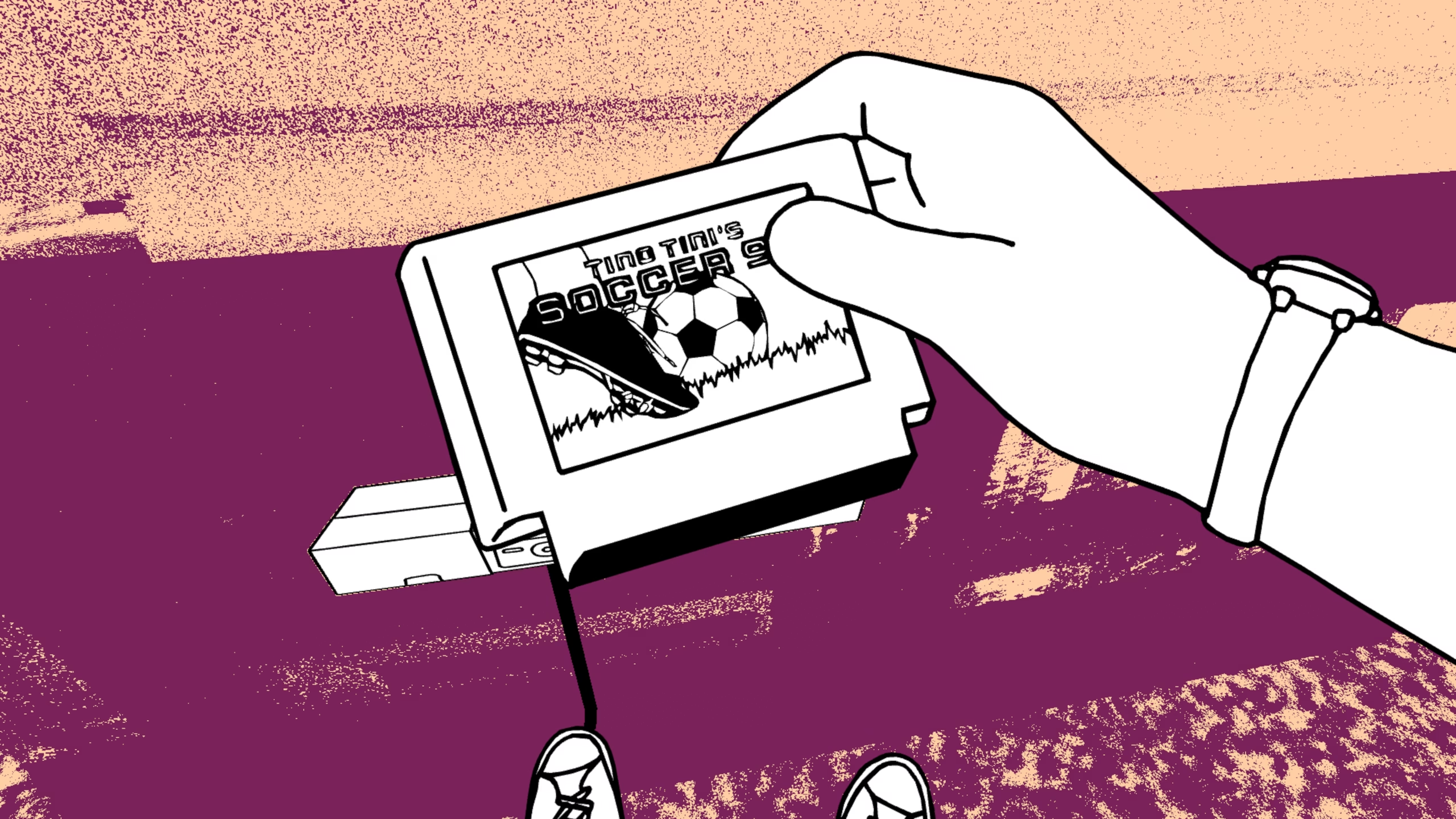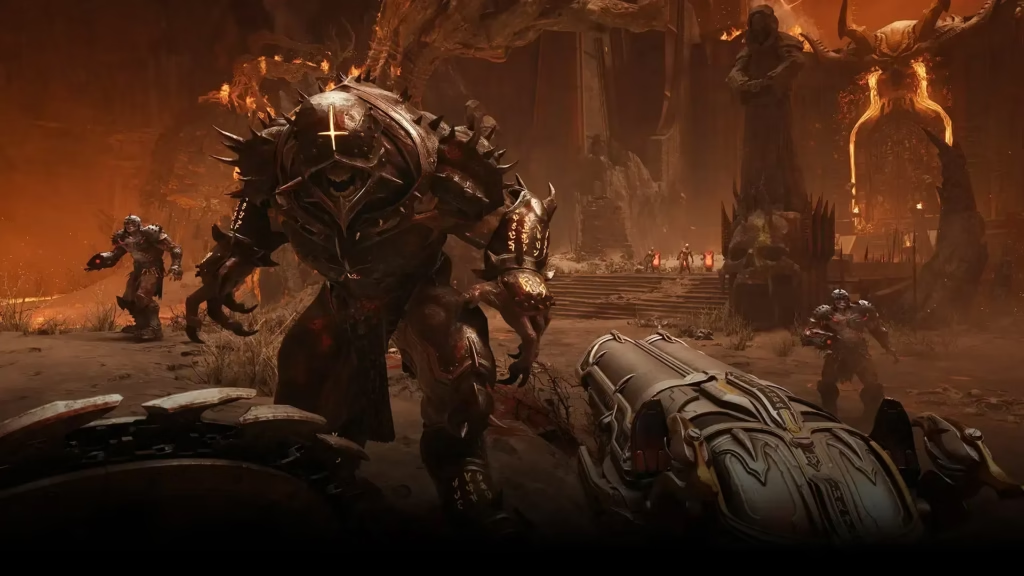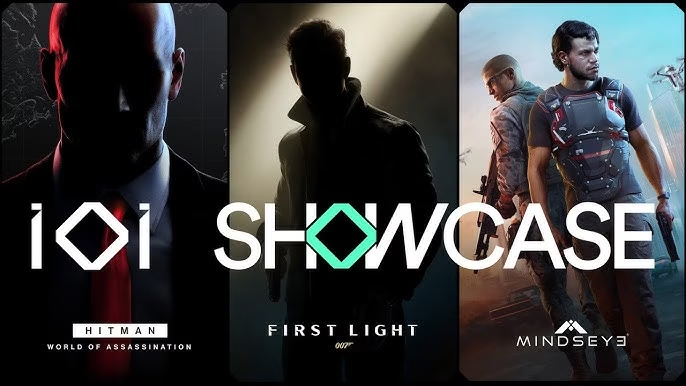Perhaps it’s the result of almost exclusively watching the English Premier League or because these two players have thwarted Arsenal in recent times, but Pervis Estupiñán and Moises Caicedo are the only aspects of Ecuadorian football that come instantly to mind. Scratch my head a bit and the names of Enner Valencia and Antonio Valencia (no relation to one another) emerge. But that’s where I draw a complete blank. An eagerness to fill in those blanks was the reason I was drawn initially to Despelote. The marvellous use of gameplay as a storytelling device was the reason I stayed.
Developed by Julián Cordero and Sebastián Valbuena of Ecuador, the game is a first-person slice-of-life set in Quito in 2001. The events of the game occur alongside Ecuador’s ultimately successful World Cup qualification campaign that sent the country to Japan and South Korea the following year. Making this achievement all the more memorable was the fact that this was the first time La Tricolor made it to the business end of the tournament.
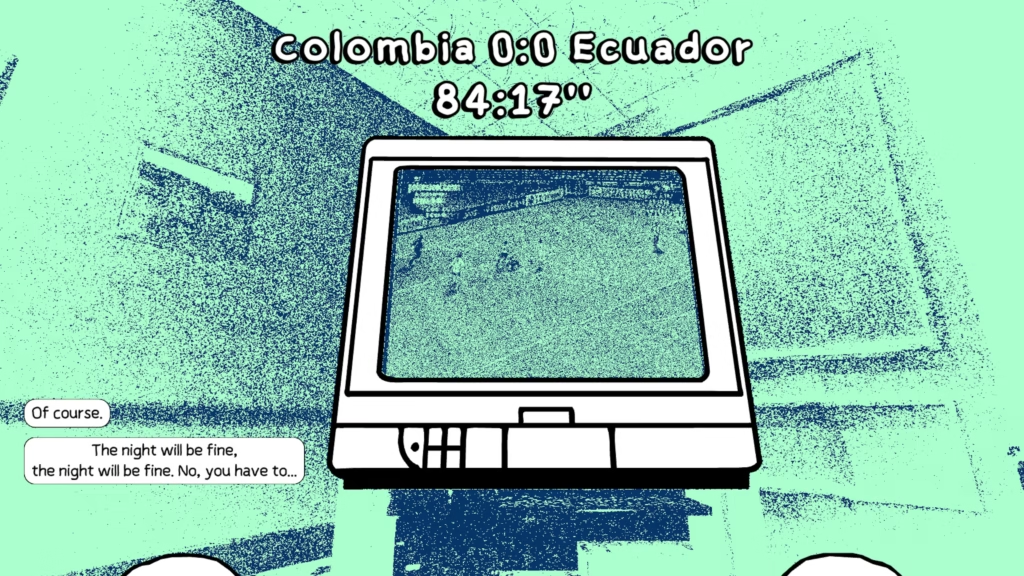
In an interview, Cordero explains that the game’s title is a play on the fact that ‘pelote‘ means ball in Spanish and that ‘despelote‘ means a complete mess — apt considering you play a very young version of Cordero kicking a ball around, being mischievous and making a mess. Despelote feels semi-autobiographical, but in a manner that’s less about the narrator than the spatial and temporal setting of the piece.
The ballad of El Tín
Aside from being the scorer of Ecuador’s first goal in World Cup football, Agustín Delgado is regarded as one of the heroes of the country’s World Cup 2002 qualification campaign. In Despelote, his iconic status is made abundantly clear with NPCs going about their business while speaking of him in hallowed terms. And I’d go as far as to say it’s not just him, but Ecuadorian football that is the star of the game. It’s palpable in the way people are clamouring for a sight of any screen showing the matches, classes in school are disrupted due to an impending match, and even banquets have to make accommodations for football enthusiasts.
It’s in equal parts heartening and awe-inspiring to watch the depiction of World Cup excitement spread through word-of-mouth, a sense of togetherness and blind hope rather than the cynical and hyper-commercial sort to which we are more accustomed. The sort that is measured in terms of ad revenue and fuelled by obnoxiously large billboards emblazoned with daft catchphrases like “Do it or blue it” or some such. Anyway, as always, I digress. The fragments of excited, dejected or hopeful conversation (depending, of course, on the context) that I’d pick up while standing outside the TV store watching matches on the display units were a highlight of the way World Cup excitement is conveyed in Despelote.
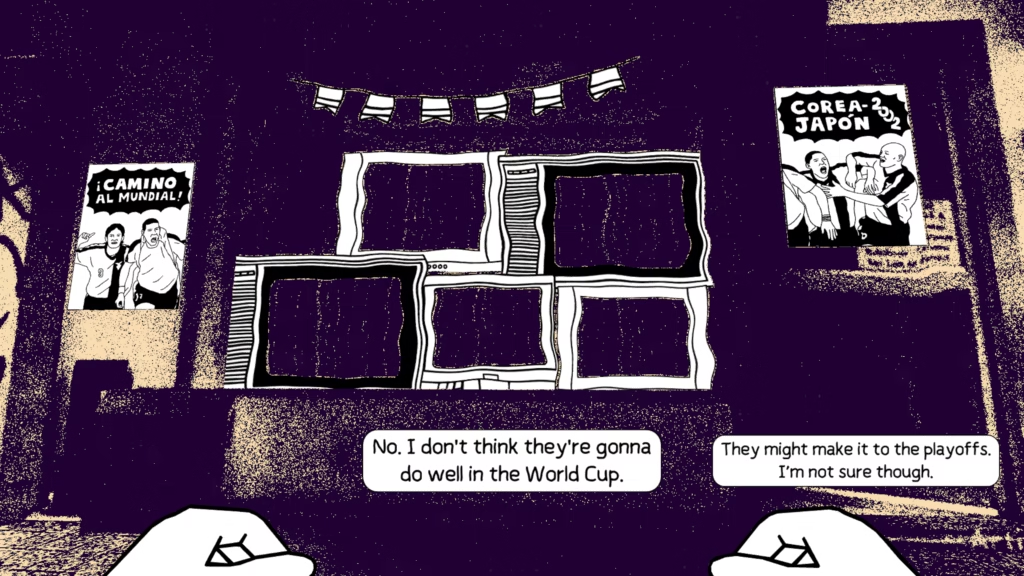
What starts off as a story about a football-mad eight-year-old trying to get through the mundanities of everyday life so he can get his fix of the beautiful game — whether that’s in the form of kickabouts with his friends, videogames or watching matches on TV — very soon turns into a broader look at the socio-econo-politics of Quito in 2001. That said, there’s no major commentary to be found here, instead it’s an examination through the eyes of a child. And no sooner than you’ve grown accustomed to the key narrative devices, Despelote jumps back and forth in time for a bit more fun. At this point, I’m afraid of saying another word for fear of spoiling it for you, so I’ll leave it there.
El juego bonito
As captivating as the narrative is, it’s fair to say it would struggle to have the same impact were it not for the gameplay. Framed in a first-person perspective, Despelote puts you in the cleats of young Cordero, which means you spend your time doing pretty much what an eight-year-old would. And if you are this particular eight-year-old, then a lot of that involves kicking a football around. The only previous time I’ve ever played videogame football in first-person mode was in FIFA 23‘s career mode, and that was a mixed experience — owing primarily to the fact that peripheral vision, which is quite vital in 11 versus 11 football, was lacking. In Despelote and considering its far more laid-back and scaled-down setting, however, it’s a delight to dribble the ball around, pass it to your friends and hoof it at the game’s various objects and environments.
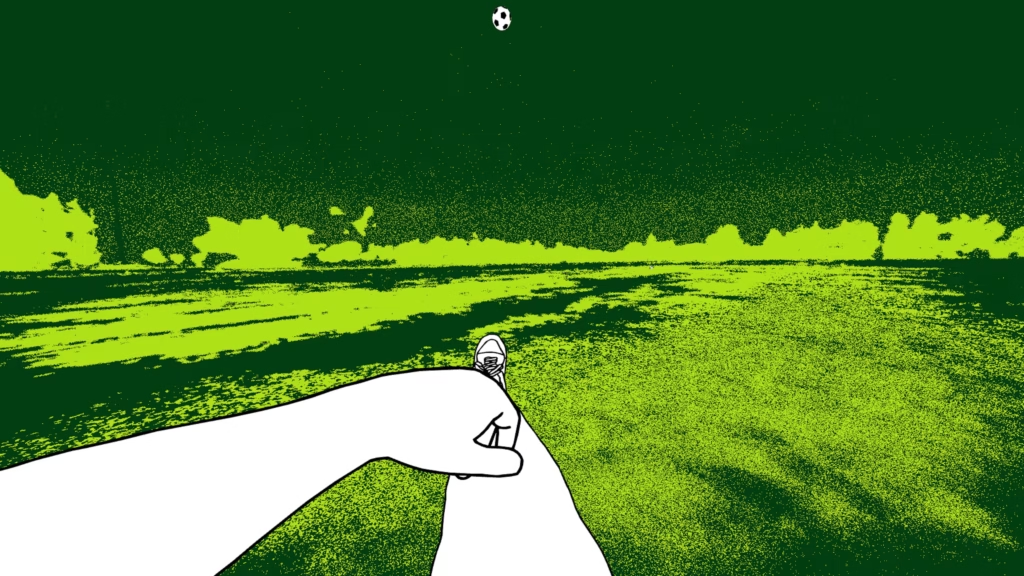
I especially enjoyed waiting for pigeons to collect around an elderly gentleman who presumably wanted to feed them, and then aiming the ball square at the gathering. There was just something so deliciously evil about watching him shake his fist at me as they scattered (it might be time to accept that I’m not as well-adjusted as previously imagined). After I’d had enough of that, it was time to put my laces through the ball and knock bottles off a residential wall, much to the chagrin of the locals. By making environments relatively easy to traverse, it’s possible to dribble and kick your way across the entire area that makes up Cordero’s neighbourhood.
And it’s in this seemingly sparsely populated neighbourhood that Despelote truly shines by turning the mundane quite magical. Most objects are interactive to an extent. Several can be kicked around, and in so doing, capture the spirit of a football-crazy child itching to have a ball at his feet. The rest include posters that magically come to life upon clicking near them, plants that yield flowers that can be plucked and admired, and all manner of NPCs that can be greeted. Over the course of your admittedly brief time (the game took me a little over a couple of hours) as Cordero, you’ll even try your hand at drawing a frog, take a geography test and play a videogame. Despite the fairly simple controls, all of these activities were quite delightful.
Tiki-taka and the final whistle
Another point I’d be remiss not to mention is the seamless, almost tiki-taka-esque, transition from one situation to another. For instance, you will find yourself in a scene where Cordero is dressed to the nines and off for a family lunch. And then, you’ll watch as it suddenly morphs into a setting many years into the future, before it returns to Ecuador’s Road to World Cup 2002. These transitions form some of the most wonderful storytelling I’ve seen in narrative adventures for quite some time.
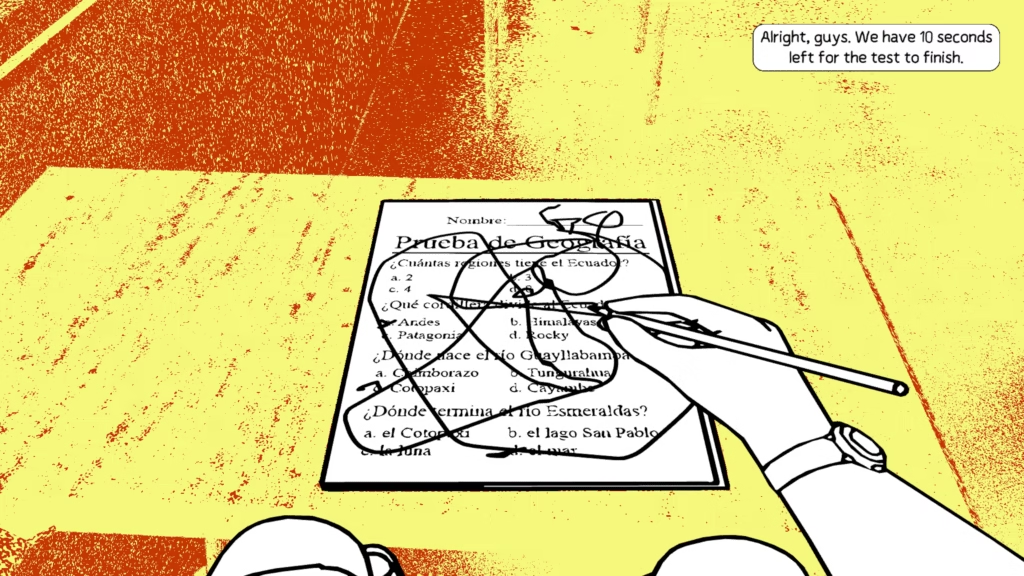
Coupled with the evolving colour scheme of your environment (see images above), the narrative simultaneously anchors you to and liberates you from timeframes to paint a rich and non-linear story that’s over far too quickly. And it’s here that I feel my gushing praise should be tempered with some criticism. The first of which is that I feel the game could’ve been a bit longer, with a few more avenues of Cordero’s life being explored, plus another handful of activities and interactions. I would, for example, have enjoyed spending a bit more time at his school, getting to know his friends, finding out more about his relationship with his little sister and so on. Great art is supposed to leave you hungry for more, but I was left rather famished — which isn’t ideal.
Second, I feel like the voice-acting could have used some work. The monotone delivery works in certain aspects, like a scene late in the game that features a director’s commentary of sorts (you’ll need to check it out for yourself), but for the most part, the voice actors sound disinterested. Which is a colossal shame since the material is ripe for emotive speech, and the developers reportedly spent a great deal of time in Quito recording local sounds. Maybe the understated voice-acting was a design choice, but I’m not sure it was the right one.
And finally, it’s the clunky menu design. I’m all for minimalist menus that don’t faff around and get you straight to where you want to be. However, and considering the structure of Despelote, I would’ve liked to have seen a chapter-wise breakdown that allowed me to access specific sections and replay them, do things differently or just punt the ball at people for a bit longer. This also impacts replayability. Overall, however, this is a game I cannot recommend enough, whether your capacity for football and football-related games is that of a thimble or a bucket. It’s one of the rare games that marries the world’s favourite sport and childhood together in a manner that perfectly captures the spirit of both. And if you need further convincing, here’s a trailer:
Retail copy of the game reviewed on Xbox Series X
